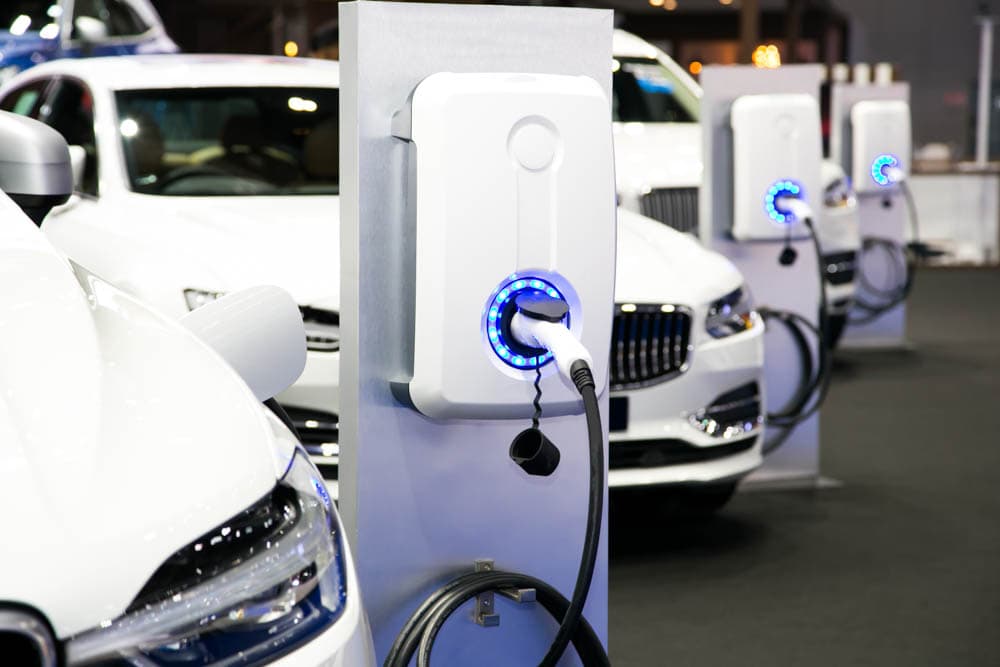
by Bailey McRae
Considering buying an electric vehicle through your company?
With more and more companies like Amazon investing in electric delivery vehicles, we are seeing lots of questions at the Lucrum office. We’ve put together the answers to frequently asked electric vehicle (EV) questions, from general questions about average range and charging speeds to tips for calculating whether purchasing an EV will be cost-effective for the business.
A person can save as much as $14,500 in fuel costs by owning an electric car for 15 years.
What is the operating range of an electric vehicle, and when can I expect the range to suffer?
Most fully charged electric vehicles average more than 200 miles, with trucks getting up to 300 miles. More energy will be burned at highway speeds than city speeds. Additionally, if the weather drops to 20 degrees or below, and the heater is in use, an average EV’s range drops by 41%. So, a car with a 200 mile range will drop to 118 miles under 20 degrees, and a truck with a 300 mile range will drop to 177 miles under 20 degrees. In the summer, the range drops by 17% with the AC running.
Also, don’t forget to factor in towing or hauling if a truck is being considered. Check out well known Youtuber Tyler Hoover’s review of the Ford Lightning’s towing ability (or lack thereof).
Where and how can I charge the electric vehicle?
The number of public stations is growing and can be located by using apps from charging networks like ChargePoint and EVgo. These apps also show what type of charging they support. Keep in mind, while not intuitive for most people, charging beyond about 80% can be counter-productive as charging efficiency drops dramatically wasting everyone’s time.
- Level 1 charging: standard 110-volt wall outlet.
- Takes 8-24 hours to fully charge
- Level 2 charging: (most public units): install a 240-volt service.
- Takes 4 hours to fully charge. Costs between $1,000 and $2,500 to install (national average).
- Level 3 charging: (some public units):
- Takes 30-60 minutes for up to 80% charge
Tesla flaunts it’s Superchargers and the integrated network that can guide users to the closest charger and even shares how many of the ports are available so drivers don’t waste time driving out of their way only to find all spots are taken.
For non-Tesla EV’s, charging can be less convenient. Unexpected issues like out-of-order charging stations, incompatible plugs, or inconsiderate users can certainly add to range anxiety. TFL-EV has a primer on EV charging to help set expectations and etiquette.
Does the government provide any credits for electric vehicles for business?
The federal government gives buyers of new EVs a one-time $7,500 tax credit; if leasing the tax break is applied to the transaction price to lower the monthly payments. This applies as either a personal credit or a business credit but can only be applied to both if the vehicle is being used in both a personal and business capacity. In that case the credit is applied as a percentage according to use. The credit is claimed on Form 8936.
Additionally, there are states and cities that offer EV incentives, including NC and SC.
How long does an EV last? How much does an electric vehicle’s battery cost to replace?
Federal regulations require an EV’s power cells be covered under warranty for at least 8 years or 100,000 miles. Some models will only replace the battery pack if it reaches a specified reduced capacity percentage while under warranty.
An EV battery will degrade over time and can cost anywhere from $5,000 to $15,000 to replace, not including the cost of labor.
How much does it cost to insure and maintain an electric vehicle?
The premiums are 21% higher, on average, compared to internal combustion engine (ICE) models.
The average cost to maintain an EV, without insurance, is $949 annually. Over a 200,000 mile vehicle’s lifetime, an EV owner will spend half as much on regular maintenance as they would for a gas-powered car.
How much will charging an electric car add to my electric bill?
Charging an electric car will typically add $30 to $60 a month to a utility bill.
Charging an electric car will typically add $30 to $60 a month to a utility bill.
If I want to provide my employee with an electric vehicle, what are some of the things I need to consider?
For an employee to continually operate an EV in a cost-effective way, they will likely need a dedicated charging station installed in their garage. If they do not have a garage, then a specific charging unit for that purpose will need to be purchased and professionally installed according to local building codes. The employee will expect to be reimbursed for the extra electricity that the charging station uses, so a conversation about that will need to be had.
Another question to consider: How much room is in your employee’s electrical panel? Most homes pull either 60, 100, or 200 amps of current. The level 2 EV charger needs 30-50 amps and considering that people usually have other appliances plugged in, a house that pulls 60 amps of current is not feasible. Furthermore, the Electrical Code requires an electrical circuit to be rated for 25% greater amperage than the charger requires. Circuit breakers will need to be available for the charger, which a certified electrician would be able to verify.
Would installing a charging station on work grounds be cost-effective? That would depend on how far away employees are driving for work purposes and how often they return to the office.
What does an electric vehicle cost? What is the resale value?
The average cost of an electric vehicle is about $67,000. Electric vehicles generally have a worse resale value than a gas-powered vehicle, where EVs lose more than $5,700 per year for the first five years on average, compared to an ICE vehicle which loses less than $3,200 per year.
How much will I save on gas by driving an electric vehicle?
A person can save as much as $14,500 in fuel costs by owning an electric car for 15 years (almost $1000 for every year of driving). The cost of running an electric car is thought to be the equivalent of $2 per gallon.
Need help performing a cost-benefit analysis for an electric vehicle purchase for your business? Book a complimentary consultation with one of Lucrum’s CFOs.



